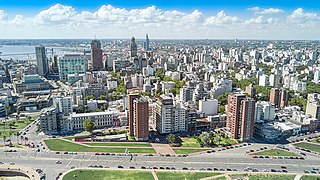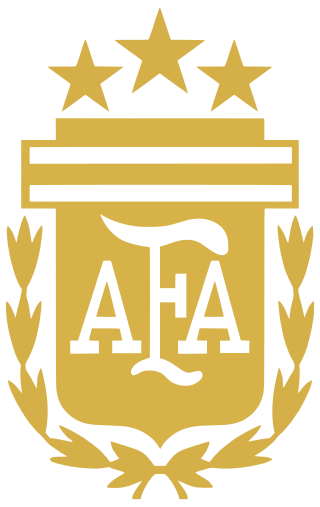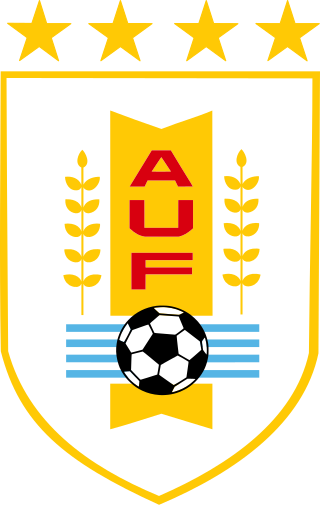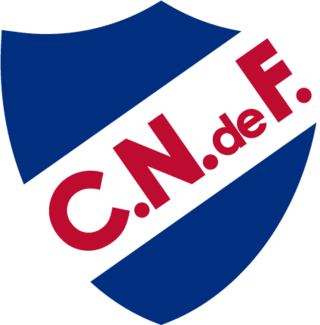
Uruguay, officially the Oriental Republic of Uruguay, is a country in South America. It shares borders with Argentina to its west and southwest and Brazil to its north and northeast, while bordering the Río de la Plata to the south and the Atlantic Ocean to the southeast. It is part of the Southern Cone region of South America. Uruguay covers an area of approximately 176,215 square kilometres (68,037 sq mi). It has a population of around 3.4 million, of whom nearly 2 million live in the metropolitan area of its capital and largest city, Montevideo.

Montevideo is the capital and largest city of Uruguay. According to the 2011 census, the city proper has a population of 1,319,108 in an area of 201 square kilometers (78 sq mi). Montevideo is situated on the southern coast of the country, on the northeastern bank of the Río de la Plata.

The 1930 FIFA World Cup was the inaugural FIFA World Cup, the world championship for men's national football teams. It took place in Uruguay from 13 to 30 July 1930. FIFA, football's international governing body, selected Uruguay as the host nation, as the country would be celebrating the centenary of its first constitution and the Uruguay national football team had retained their football title at the 1928 Summer Olympics. All matches were played in the Uruguayan capital, Montevideo, the majority at the purpose built Estadio Centenario.

Club Atlético Peñarol, more commonly referred to as Peñarol, is a Uruguayan professional football club based in Montevideo. The club currently competes in the Uruguayan Primera División, the highest tier in Uruguayan football.

The Argentina national football team, nicknamed La Albiceleste, represents Argentina in men's international football and is administered by the Argentine Football Association, the governing body for football in Argentina.

The culture of Uruguay is diverse since the nation's population is one of multicultural origins. Modern Uruguayan culture is known to be heavily European influenced, mostly by the contribution of its alternating conquerors, Italy, Spain and Portugal, and from the large numbers of immigrants who arrived in the country from the 19th century onwards.

The Uruguay national football team, nicknamed La Celeste, represents Uruguay in international men's football, and is administered by the Uruguayan Football Association, the governing body for football in Uruguay.

Diego Forlán Corazo is a Uruguayan professional tennis player, football manager and former football player who played as a striker. Regarded as one of the best forwards of his generation, Forlán is a two-time winner of both the Pichichi Trophy and the European Golden Shoe at club level. With the Uruguay national team, he had notable individual success at the 2010 FIFA World Cup, finishing as joint top scorer with five goals, winning the goal of the tournament, and winning the Golden Ball as the tournament's best player.

Club Nacional de Football is a Uruguayan professional sports club based in La Blanqueada, Montevideo.

Defensor Sporting Club is a sports club based in Montevideo, Uruguay. Founded in 1913, Defensor has several sports sections, with football and basketball being the most important and the ones in which the club has achieved significant achievements in Uruguay and internationally.

Sport in Uruguay has been an important part of Uruguayan culture, since the early start of the nation. Winners of such important awards such as the FIFA World Cup, the French Open, and Olympic medals, Uruguay has been a constantly successful sports nation in continental and world aspects.

The Liga Profesional de Primera División, named "Torneo Uruguayo Copa Coca-Cola" for sponsorship reasons, is the highest professional football league in Uruguay organized by the Uruguayan Football Association (AUF).

The Uruguay national rugby union team, nicknamed Los Teros, represents the Uruguayan Rugby Union in men's international rugby union. One of the older test sides in the world, Uruguay has qualified five times for the Rugby World Cup, in 1999, 2003, 2015, 2019 and most recently 2023. As of 10 July 2023 they are ranked 17th in the world, and are ranked 2nd in the Americas region, behind rivals Argentina.
The Uruguayan Football Association is the governing body of football in Uruguay. It was founded in 1900, as The Uruguayan Association Football League, and affiliated to FIFA in 1923. It is a founding member of CONMEBOL and is in charge of the national men's team and the national women's team, as well as the Uruguayan football league system.

Luis Alberto Suárez Díaz is a Uruguayan professional footballer who plays as a striker for Major League Soccer club Inter Miami. Nicknamed "El Pistolero", he is widely regarded as one of the best players of his generation and one of the greatest strikers of all time. Individually, he has won two European Golden Shoes, an Eredivisie Golden Boot, a Premier League Golden Boot and a Pichichi Trophy. He has scored over 500 career goals for club and country.

Edinson Roberto Cavani Gómez is a Uruguayan professional footballer who plays as a striker for Argentine Primera División club Boca Juniors. Nicknamed "El Matador", he is considered as one of the best strikers of his generation.

Óscar Washington Tabárez Silva, known as El Maestro, is a Uruguayan former professional football manager and former player.
Uruguay national under-20 football team represents Uruguay in international football competitions such as FIFA U-20 World Cup and the South American Youth Football Championship. They are the current reigning FIFA U-20 World Champions.
The COVID-19 pandemic in Uruguay has resulted in 1,042,389 confirmed cases of COVID-19 and 7,692 deaths.
The Honorary Scientific Advisory Group was an advisory committee created by President Luis Lacalle Pou in April 2020, as a support group on the wake of the COVID-19 pandemic in Uruguay.